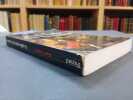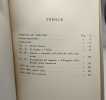51 books for « ernst cassirer »Edit
-
Century
20th (37)
21st (1)
-
Countries
Belgium (2)
Canada (4)
Denmark (3)
France (39)
Switzerland (3)
-
Syndicate
ALAC (4)
ILAB (28)
NVVA (1)
SLACES (1)
SLAM (20)
The phenomenology of knowledge - VOLUME 3 / The philosophy of Symbolic forms
Yale university press 1976 in8. 1976. Broché.
couverture défraîchie frottée intérieur propre
La Philosophie des Lumières
Agora 1986 450 pages poche. 1986. Broché. 450 pages.
proche du très bon état
VOM MYTHUS DES SAATES
ARTEMIS-VERLAG/ERASMUS BIBLIOTHEK. 1949. In-12. Cartonnage d'éditeurs. Etat d'usage, Couv. légèrement passée, Dos fané, Intérieur frais. 410 pages. Texte en allemand.. . . . Classification Dewey : 830-Littératures des langues germaniques
Classification Dewey : 830-Littératures des langues germaniques
LA PHILOSOPHIE DES LUMIERES
FAYARD 1986 Soft Cover New
COLLECTION AGORA N°12-TRADUIT DE L'ALLEMAND ET PRESENTE PAR PIERRE QUILLET-450 PAGES-11 CM X 18 CM-COUVERTURE ILLUSTREE-(12E)
Die Philsophie der Aufklärung. - [AN IMPORTANT WORK IN THE HISTORY OF PHILOSOPHY]
Tübingen, J.C.B. Mohr, 1932. 8vo. Orig. full grey cloth. A nice, clean and solid copy. XVIII, 491 pp.
First edition of one of Cassirer's important works within the field of history of philosophy" the work was translated into English twenty years later under the title ""Philosophy of the Enlightenment"".Ernst Cassirer occupies a unique place in twentieth century philosophy. Untraditionally his works are equally concentrated on foundational and epistemological issues in the philosophy of mathematics and natural science and on aesthetics, the philosophy of history, and other ""cultural"" issues in general.No other German philosopher since the time of Kant has aimed so broadly and payed equal attention to the philosophy within both mathematical and natural sciences as well as the humanistic disciplines. He thus plays an otherwise non-existing mediating role in the 20th century between the different disciplines, as well as between analytic and continental philosophy, -two sorts of philosophy usually regarded as incompatible. - Cassirer was able to maintain fruitful philosophical relations with leading members of both traditions (e.g. with Moritz Schlick, the founder and guiding spirit of the Vienna Circle of logical empiricists, whose work in logic and the philosophy of science had a decisive influence on the development of philosophy in the United States, and on the other hand with Martin Heidegger, the dominating philosopher in continental Europe in the 20th century).Ernst Cassirer was born in Breslau in Poland in 1874. He studied philosophy of law, germanistics, philosophy, science of history, and history of art at the University of Berlin, where he became Privatdozent in 1906. In 1919 he became Professor of Philosophy at the newly grounded University of Hamburg, but being a Jew he had to leave the country in the beginning of the thirties. After having been visiting professor in Oxford for a couple of years, he became visiting professor at the University of Götheborg in Sweden, where he four years later became a Swedish citizen. The following year (1940) he became Professor in Götheborg. He died in 1945.
Zur Logik der Kulturwissenschaften. Fünf Studien. - [THE RE-ESTABLISHMENT OF ""CULTURE""]
Göteborg, 1942. Lex8vo. Uncut in the orig. wrappers. Minor soiling to wrappers and inner hinges, otherwise a clean copy. 139, (1) pp.
Rare first edition of Cassirer's important work on ""The Logic of Cultural Science"", in which he tries to re-establish the earlier use of the term ""culture"" in the more narrow sense of the word in order to oppose it to ""nature"" and protect it against the methodology of natural science that had ruined the conception of the term since the middle/late 19th century and onwards. In the beginning of the second study of this work (p. 39), Cassirer states that the crisis in which philosophy and science has been found to be since the death of Hegel and Goethe is most evident in the relationship between natural science and cultural science that was prevailing hereafter. Cassirer now differentiates between the cosmos of nature and the cosmos of culture, and he claims that the philosophy that applies to both is no cultural philosophy, but a sort of reflection within the philosophy of science that was to maintain the separate concepts of nature and culture, of natural science and cultural science.""(N)äher als die Ordnung der Natur steht dem Menschen die Ordnung, die er in seiner eigenen Welt findet. Auch hier hersscht keineswegs blosse Willkür."" says Cassirer on the first two pages of the book (pp. 3-4), and from here he goes on to talk about the relationship between nature and culture, which leads on to the question about man (and the ""I"") and his role in the world, -i.e. the natural and the cultural world"" he brings the objective and the subjective together in his notion of art by saying that ""Es gehört zu den grössten Leistungen der Kunst, dass sie hierzu fähig ist, dass sie noch in Individuellen das Objektive erfühlen und erkennen lässt, während sie andererseits alle ihre objektiven Gestaltungen konkret und individuell vor uns hinstellt und sie damit mit dem stärksten und intensivsten Leben erfüllt."" (p. 38). He thus talks about the function of expression (""Ausdrucksfunktion""), which is the only function of signal that ""Mythos"" possesses, and he claims that a radical separation of objective and subjective is impossible within the Mythos, which is not only psychological and sociological, but also symbological (""Symboltheoretisch""). On the principles of pure symbolic principles Cassirer wishes to make it possible to interpret and characterize certain mythological phenomena without having to trace them back to a concrete or pre-historical content. The mythological power and the experience of the holy is something different from the actual categories of thought and are as such essential to man and ""I"".With the ownership signature of Samuel Skulsky, the famous Jewish philosopher of science and logic, on title-page.Enst Cassirer was born in Breslau in Poland in 1874. He studied philosophy of law, germanistics, philosophy, science of history, and history of art at the University of Berlin, where he became Privatdozent in 1906. In 1919 he became Professor of Philosophy at the newly grounded University of Hamburg, but being a Jew he had to leave the country in the beginning of the thirties. After having been visiting professor in Oxford for a couple of years, he became visiting professor at the University of Götheborg in Sweden, where he four years later became a Swedish citizen. The following year (1940) he became Professor in Götheborg. He died in 1945.The present work is published in Götheborg while he was visiting professor at Yale University.
Ernst Cassirer: Gesammelte Werke. Hamburger Ausgabe. I-XXV [25 vols.]
Darmstadt, Wissenschaftlichte Buchgesellschaft 1998-2007 the complete works of Cassirer in 25 volumes: over 10000pp., 25cm., cloth with dustwrapper, few minor tears in some of the dustwrappers, few little stains on the edges of 2 volumes, else in very good condition, [does not include vol.26 ("Register mit CD-Rom")], F75770
Phone number : +32476917667
Philosophie der symbolischen Formen. Erster Teil: Die Sprache.
Berlin, Bruno Cassirer, 1923. 8vo. Orig. half cloth, spine sunned. XII, 293, (2) pp.
First Edition of the first part - that on language - of Cassirer's hugely influential main work, in which he succeeds in finally transforming traditional transcendental philosophy into cultural philosophy.The work appeared in three volumes, over six years, with the final third volume appearing in 1929. Neither of the volumes are easy to find in the first editions.
Geist und Leben. Schriften.
2003 Reclam Verlag, Leipzig, 2003. Un volume in-8 broché, texte en allemand, 351 pages. Bel état.
La librairie est ouverte du mardi au samedi de 9h30 à 12h30 et de 13h30 à 19h00. Commandes par courriel ou téléphone. Envoi rapide, emballage soigné.
Descartes, Corneille, Christine de Suède
1942 Traduction de Madeleine Francès et Paul Schrecker Librairie Philosophique J. Vrin , Etudes de Psychologie et de Philosophie Fercé, France 1942, In-8, Bon etat
Ray D5*
Le Problème de la Connaissance dans la Philosophie et la Science des Temps Modernes. IV. De la mort de Hegel à l'époque présente.
Les Editions du Cerf, coll. Passages, 1995, 1 volume in-8 de 420 pages, broché.
Bon état.
Logique des Sciences de la Culture. Cinq Etudes.
Traduit de l'allemand par Jean Carro, précédé de fondation critique ou fondation herméneutique des sciences de la culture, par Joël Gaubert, 1 vol. in-8 br., coll. Passages, Les Editions du Cerf, Paris, 1991, 232 pp.
Véritable testament intellectuel de Cassirer, ces études publiées à l'origine en 1942 approfondissent le thème central de ses recherches : quelles sont les conditions de possibilité de l'objectivité dans les sciences de la culture ? Bon exemplaire (ex-libris ms., parfait état par ailleurs)
La Philosophie des formes symboliques
Minuit éditions (1/1980)
LIVRE A L’ETAT DE NEUF. EXPEDIE SOUS 3 JOURS OUVRES. NUMERO DE SUIVI COMMUNIQUE AVANT ENVOI, EMBALLAGE RENFORCE. EAN:9782707302731
La Philosophie des formes symboliques
Minuit éditions (1/1980)
LIVRE A L’ETAT DE NEUF. EXPEDIE SOUS 3 JOURS OUVRES. NUMERO DE SUIVI COMMUNIQUE AVANT ENVOI, EMBALLAGE RENFORCE. EAN:9782707303868
La philosophie des formes symboliques tome 2 la pensée mythique.
Paris, Les editions de minuit , 1972; in-8, 344 pp., br. La philosophie des formes symboliques tome 2 la pensée mythique.
La philosophie des formes symboliques tome 2 la pensée mythique.
LA PHILOSOPHIE DES LUMIERES
Paris Fayard 1966 in 8 (21,5x15) 1 volume broché, couverture illustrée, 614 pages [1]. Collection ''L'histoire sans frontières''. La philosophie des formes symboliques, tome 3: La phénoménologie de la connaissance. Bon exemplaire ( Photographies sur demande / We can send pictures of this book on simple request )
Très bon
La philosophie des formes symboliques. Tome 3 : La phénoménologie de la connaissance
Les Éditions de Minuit Couverture souple Paris 1972
Bon Fort in-8. 614 pages. Traces de plis à la couverture, ex-libris manuscrit en page de garde. Tome 3 seulement. Coll. "Le sens commun".
Logique des sciences de la culture. Cinq études. Précédé de : Fondation critique ou fondation herméneutique des sciences de la culture ?
Cerf Couverture souple Paris 1991
Très bon In-8. 232 pages. Coll. "Passages".
Substance et fonction. Éléments pour une théorie du concept
Les Éditions de Minuit Couverture souple Paris 1977
Très bon In-8. 429 pages. Ex-libris manuscrit d'un ancien propriétaire. Coll. "Le Sens commun".
La philosophie des Lumières
Fayard 1990 In-8 broché 23,5 cm sur 15,3. 351 pages. Dos légèrement passé, accroc en pied du dos. État correct d’occasion.
Etat correct d’occasion
Individuo e cosmo nella filosofia del Rinascimento - 1974
La Nuova Italia 1974 in8. 1974. Broché.
Bon état de conservation intérieur propre bonne tenue édition 1974
Kant's Life and Thought
Yale university press 1983 430 pages 15 4x3 4x23 2cm. 1983. Broché. 430 pages.
Bon état de conservation couverture défraîchie intérieur propre
LA PHILOSOPHIE DES LUMIÈRES.
1970 Paris, Fayard, collection L'Histoire sans frontières, 1970. Traduit de l'allemand et présenté par Pierre Quillet. In-8 broché de 351 pp., avec index in fine. Couverture illustrée, à rabats. Très bon état, sans annotations ni soulignements
Langage et mythe à propos des noms de dieux. Collection : Le sens commun.
Paris, Les Editions de Minuit, 1973. 13 x 22, 127 pp., broché, bon état.
Traduit de l'allemand par Ole Hansen-Love.
"Le mythe de l'Etat - Collection "" Bibliothèque de philosophie ""."
Gallimard. 1993. In-8. Broché. Bon état, Couv. convenable, Dos satisfaisant, Intérieur frais. 402 pages.. . . . Classification Dewey : 100-PHILOSOPHIE ET DISCIPLINES CONNEXES
"Collection "" Bibliothèque de philosophie "" - traduit de l'anglais par Bertrand Vergely. Classification Dewey : 100-PHILOSOPHIE ET DISCIPLINES CONNEXES"
 Write to the booksellers
Write to the booksellers







![Die Philsophie der Aufklärung. - [AN IMPORTANT WORK IN THE HISTORY OF PHILOSOPHY]. CASSIRER, ERNST.](https://static.livre-rare-book.com/pictures/LLX/34802_1_thumb.jpg)
![Die Philsophie der Aufklärung. - [AN IMPORTANT WORK IN THE HISTORY OF PHILOSOPHY]. CASSIRER, ERNST.](https://static.livre-rare-book.com/pictures/LLX/34802_2_thumb.jpg)
![Die Philsophie der Aufklärung. - [AN IMPORTANT WORK IN THE HISTORY OF PHILOSOPHY]. CASSIRER, ERNST.](https://static.livre-rare-book.com/pictures/LLX/34802_3_thumb.jpg)
![Zur Logik der Kulturwissenschaften. Fünf Studien. - [THE RE-ESTABLISHMENT OF ""CULTURE""]. "CASSIRER, ERNST.](https://static.livre-rare-book.com/pictures/LLX/33494_1_thumb.jpg)
![Zur Logik der Kulturwissenschaften. Fünf Studien. - [THE RE-ESTABLISHMENT OF ""CULTURE""]. "CASSIRER, ERNST.](https://static.livre-rare-book.com/pictures/LLX/33494_2_thumb.jpg)
![Zur Logik der Kulturwissenschaften. Fünf Studien. - [THE RE-ESTABLISHMENT OF ""CULTURE""]. "CASSIRER, ERNST.](https://static.livre-rare-book.com/pictures/LLX/33494_3_thumb.jpg)















